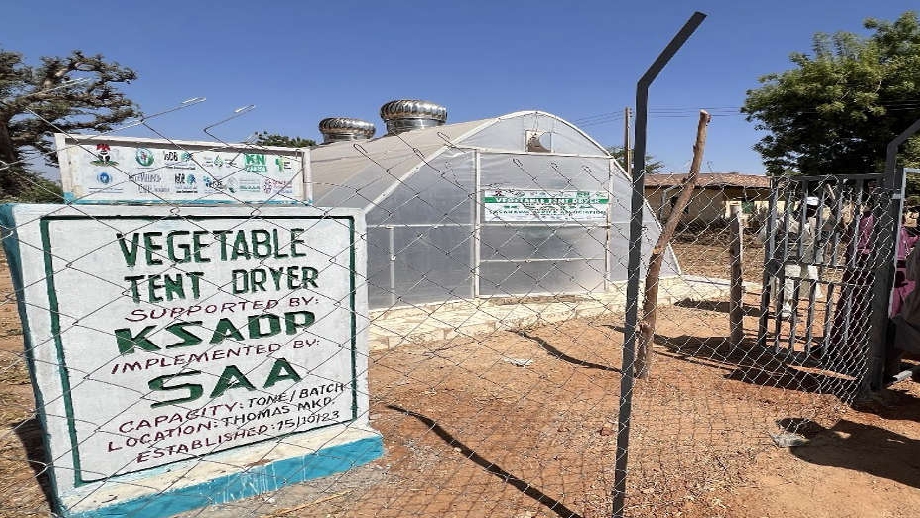
Nazifi Ma’awuya, a tomato farmer in Kano State was worn down with debt due to post-harvest loss caused by poor preservation techniques and tomato Ebola.
From 2012 to 2022, the farmer under the Thomas Makoda Farmers Association (TMFS) in Makoda Local Government Area in the State lost at least 100 baskets of tomatoes yearly and struggled to boost his farming enterprise.
Though Ma’awuya practiced the local way of tomato preservation by cutting the tomatoes into two, before spreading them on the floor, he was never lucky to make a profit as the product lost its quantity and quality.
“I practice the dry and wet season farming, so every year I lose at least 100 baskets of tomatoes because I don’t have a facility to store them,” he said.
“Believe me, it was horrible because I was living in debt for years.”
Nigeria Produces 2.3 Million Metric Tonnes of Tomatoes Annually
Nigeria is Africa's second-largest tomato-producing country after Egypt and the 13th largest producer globally with 2.3 million metric tonnes.
The national demand is estimated at 3 million metric tonnes. The 700,000 metric tonne deficit is worsened by a 50 percent post-harvest loss of all locally produced tomatoes, caused by the lack of storage facilities and poor marketing channels.
Nigeria Loses N3.5trn Annually
Data from the federal government puts the economic cost of agricultural post-harvest losses in Nigeria at N3.5 trillion annually.
The losses harm the agricultural component of the country’s Gross Domestic Product (GDP).
KSADP/SAA’s Intervention
Ma’awuya was about to give up on farming when he joined the Kano Agropastoral Development Project (KSADP), a project implemented by the Sasakawa Africa Association (SAA), to halt post-harvest losses in the state.
The Islamic Development Bank (IsDB), the Lives and Livelihood Fund (LLF), and the Kano State government funded the project.
The project's executing agency is the Kano State Agriculture and Rural Development Authority (KNARDA) with SAA as the technical partner.
KSADP/SAA trained Mu’awuya on modern farming techniques to adopt in addressing the issues and empowered him with a modern Vegetable Tent Dryer.
The solar-powered dryer facility, with a ventilator fan inside, increases the product's shelf-life and retains its color and taste so that it can be available off-season.
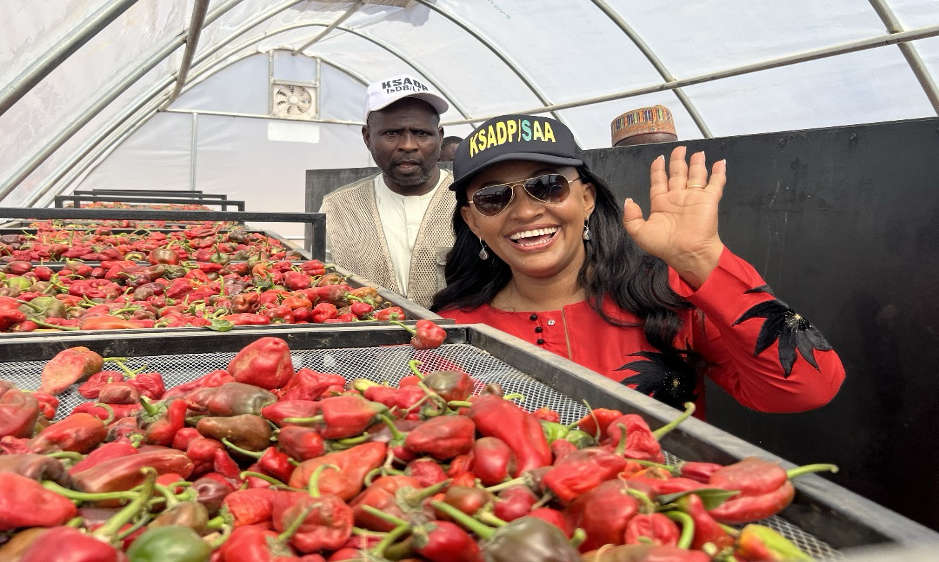
Ethiopia Tadesse, Head of Communication and Advocacy SAA, Addis Ababa, Ethiopia
The project coordinator of the Kano State Agropastoral Development Project, Sasakawa Africa Association KSADP/SAA, Abdulrasheed Hamisu Kofarmata says the dryer was established to halt vegetable post-harvest losses.
According to Kofarmata, “the local practice of drying tomatoes by the farmers affected the quantity and quality of the product, hence affecting its value in the market.”
The Programme Officer of the Nutrition-Sensitive-Agriculture (NSA), Sasakawa Africa Association (SSA), Engr. Sadiq Yakubu Hamman added that “the dryer enhances the drying process and retains the taste, quantity, and quality of the products.”
Engr. Hamman further said tomatoes can dry within five to seven days, adding that KSADP/SAA empowered the farmers with “7,000 Returnable Plastic Crates (EPCs) to transport their produce to aggregation centers.”
Impact of the Intervention
Ma’awuya who is now benefiting from the intervention revealed that “he could dry 30 baskets of tomatoes at a go.”
Ma’awuya further said that he has expanded his tomato farmland for this year’s dry season farming to increase his output.
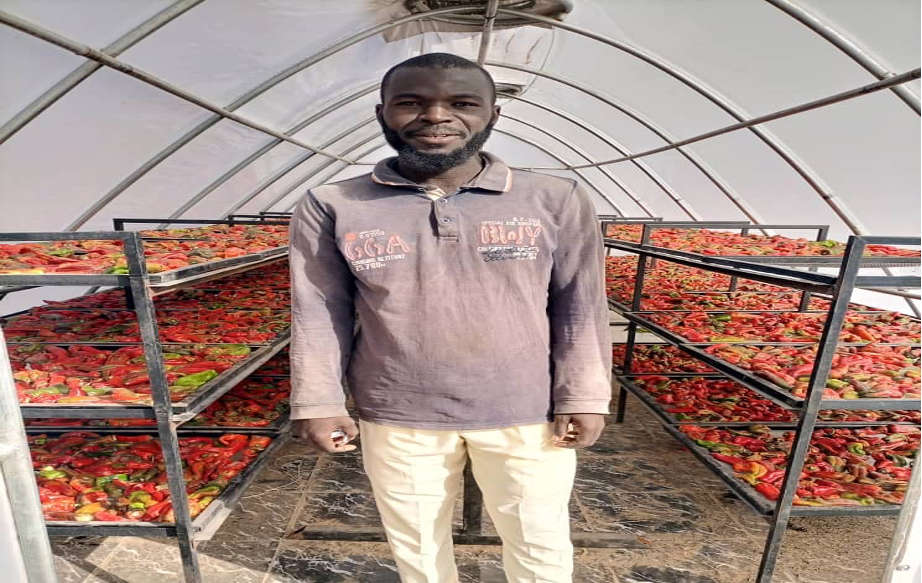
Nazifi Ma’awuya Inside the Vegetable Tent Dryer
Another Intervention in Garum Mallam Garum and Bagwai LGAs
To this end, two additional Vegetable Tent Dryers were established in Kwanar Gafan in Garun Mallam LGA and Bagwai Local Government Area due to the large number of vegetables produced in the LGAs every year.
In Kwanar Gafan in Garun Mallam alone, tomato farmers lose hundreds of baskets of tomatoes every year.
The chairman of Tomato Farmers in Garum Mallam, Sa'adu Ali Yadakwari said the intervention has helped the community to adopt modern tomato preservation methods.
“Over 200 farmers are currently benefiting from the facility,” he announced.
Ali Yadakwari further was confident the intervention "will halt the annual post-harvest losses which led to the scarcity of the products every year in the state.”
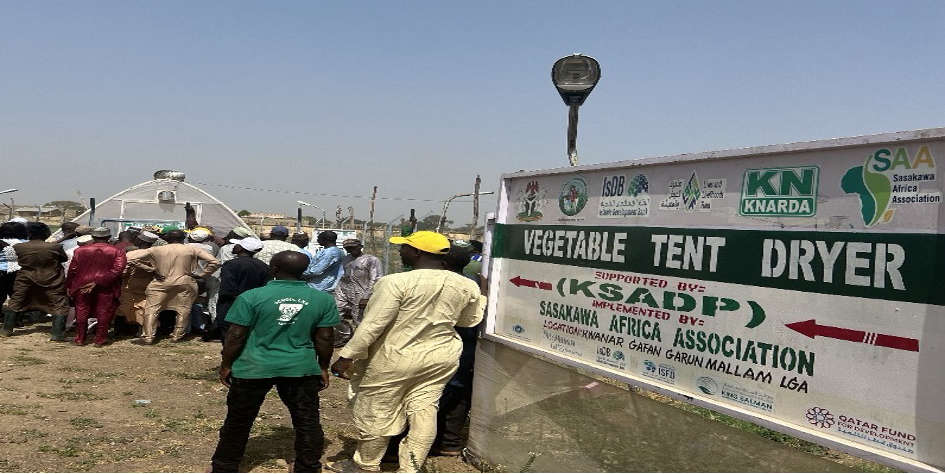
KSADP/SAA Vegetable Tent Dryer in Kwanar Gafan In Garun Mallam LGA
KSADP/SAA Empowered Women Groups with Tomato Processing Equipment
KSADP/SAA also trained three groups of women with 25 members on tomato processing and preservation.
Apart from the training, KSADP/SAA empowered the groups with tomato processing equipment.
The women groups trained are Rimin Bunu Women Farmers Multipurpose Cooperative Society, Kura LGA, and Ajuru Women Farmers Multipurpose Cooperative Society, Garun Mallam LGA.
The spokesman of the Sasakawa Africa Association (SSA), Moses Nongoatse said the training was part of the Market Oriented Approach (MOA) of SAA to create wealth from the agricultural value chain.
According to Nongoatse, “The training is to increase the nutrition in the locally processed tomatoes and generate income for the women who sell these processed tomatoes in the market when the price appreciates."
Nongoatse said the women were doing the business locally because they lacked the capital to buy the equipment, adding that the beneficiaries were currently “creating wealth for themselves."
The leader of the Ajuru Women Farmers Multipurpose Cooperative Society, Zulaiha Biliyaminu Kura said they have started processing and producing tomato paste due to the training.
She showcased the processed paste which can now be bought from supermarkets. Kura said they sell a jar of tomato paste for N500, while a jar of tomato and pepper goes for N800, helping the group to be self-reliant.
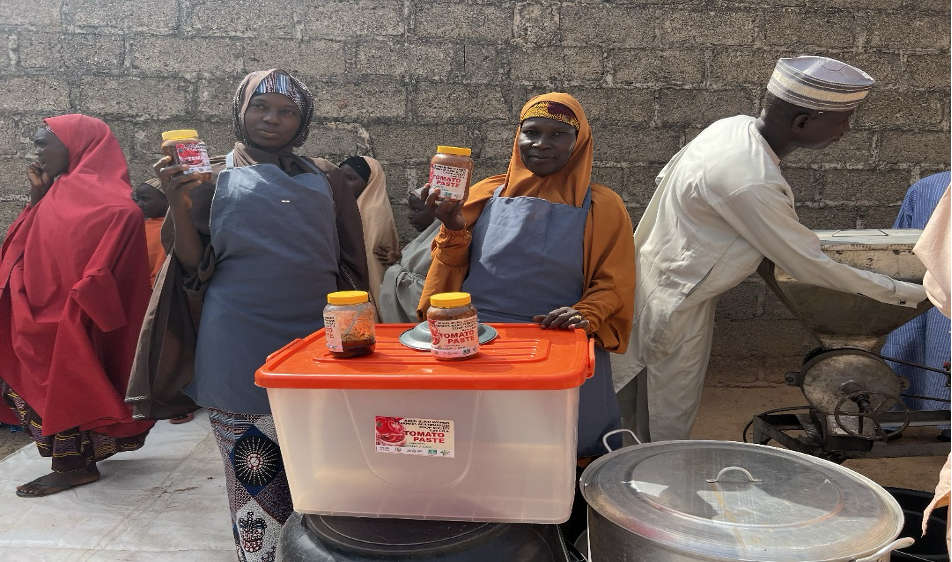
Women Group Showcase their Processed Tomato
The national chairman of the Association of Tomato Growers, Processors and Marketers Association of Nigeria, Kano Branch, Sani Danladi Yadakwari commended KSADP/SAA for its intervention.
Danladi Yadakwari said tomato farmers in the community have taken advantage of the facility to recover their post-harvest losses with the tomatoes they preserve.
To sustain it, Danladi Yadakwari revealed that farmers in the community planned to “replicate the act by making other facilities to allow more farmers to preserve their tomatoes”.
He also revealed that preparations were on the ground to start manufacturing dry tomato sachet. According to him, the move would further halt tomato scarcity during the rainy season”.
Kano Government to Expand Extension Agents
On its part, the Managing Director of the Kano State Agricultural and Rural Development Authority (KNARDA), Dr. Farouk Kurawa said the state government is keen on expanding extension agents in the state.
Dr. Kurawa, however, said the government was committed to “boosting farming and ensuring food security by providing an enabling environment for agriculture in the state."


